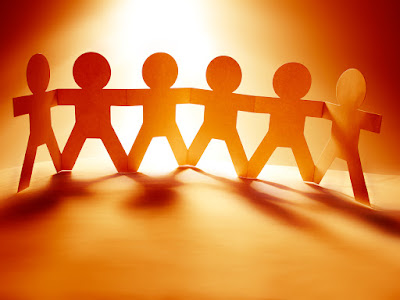In The Atlantic: "The Rise of the 3-Parent Family"
Meanwhile, it also published this shorter piece: The Rise of the 3-Parent Family (online Sept. 22). The story focuses on asexuals and the founder of AVEN, then broadens to other types of extended chosen families raising children. There is a small but growing trend for three or more adults to become the full-fledged, and some states legally official, parents of children.
The typical path to parenthood didn’t work for David Jay, a founder of the asexual movement. So he designed his own household—and is trying to show others what is possible.

Preston Gannaway photo
By Angela ChenDavid Jay [at right above] is the oldest of 12 cousins on one side of his family and the third-oldest of 24 cousins on the other. As a kid, family to Jay meant having a lot of people around, a feeling of community, and crucially, a sense of permanence.... Jay had always wanted his own family with kids—and had known, for almost as long, that he wouldn’t be able to build one the usual way.Jay is the founder of the Asexual Visibility and Education Network (AVEN) and one of the most prominent people in the asexual movement. (Asexual people, or aces, don’t experience sexual attraction, though many do have sex and form romantic relationships.) ... As he grew older, the questions on his mind moved beyond identity and attraction to issues of parenting and family life....The problem was that he wanted kids and also wanted a co-parent to help him raise kids, but wasn’t interested in romantic partnership. Before exploring single parenthood, he was curious whether there might be another way to form the family he wanted.---------------------------...Today, Jay is part of a three-parent family in northern California. He lives with a married couple, Avary Kent and Zeke Hausfather, and is not part of their marriage, but is a father to their biological daughter, Octavia, or Tavi, whose full name includes all three of their last names.Jay is Tavi’s parent just as fully and permanently as Kent and Hausfather—and just as legally too, since three-parent adoption has been recognized by the state of California. (Three-parent adoption has also been recognized by state statute in Maine, Washington State, Rhode Island, and Vermont....)Three-parent families are not a new phenomenon, and Jay doesn’t consider himself a trailblazer. Many parents, particularly those who are single or have low incomes, have long cobbled together child care by bringing relatives and friends in as informal co-parents, according to Philip N. Cohen, a sociologist of family at the University of Maryland. The idea that the default family unit consists of two straight parents and their children is outdated and doesn’t reflect the U.S. today. One 2014 Pew Research report, for example, found that fewer than half of American kids lived in a so-called traditional family environment, with two married parents on their first marriage. Divorce and remarriage are more common than they once were, as are blended families and stepfamilies—many of which feature a third parental figure. The queer and polyamorous communities, too, have plenty of examples of three-parent families.But formalizing these families through law, as Jay has done, is a relatively new possibility. Diana Adams, the founder of Chosen Family Law Center, says that interest in this option has been growing over the past 15 years, spurred by the increasing acceptance of queer families and the popularity of assisted-reproduction technologies. (Chosen Family Law Center works with New York and New Jersey residents and does national legislative advocacy.) ...Just as marriage provides benefits that cohabitation doesn’t, legal tri-parenting creates stability and rights that less formal arrangements lack. ...For Adams, tri-parenting is a way of reclaiming the “diversity and beauty of the queer community.” When it comes to queer rights, the big fight of past decades has been to legalize gay marriage, which has been significant, but has also played into the narrative that the two-parent family is and should be the default structure. “That has taken away some of the power of being able to live radically queer lives without needing to fit into a capitalist, patriarchal structure of a nuclear family,” Adams told me.Jay’s family is one step removed from what a “traditional” three-parent structure looks like. It doesn’t have roots in assisted reproduction or even polyamory, but rather in ideas about relationships that Jay has been considering for most of his life, informed by his asexual identity. ...---------------------------Jay suspects that his being a platonic co-parent has led people to be much more accepting of his family structure.... While their arrangement goes against the norm of a two-parent family, it doesn’t challenge the norm of two-person romantic relationships. “We sidestep all of the shaming and social scripts that would be [involved] in a poly three-parent family,” he told me.......“All of our research points to the fact that it’s the quality of the relationships that matters [for child raising], and the handling of communication and conflict, and the number of people in the household is not really the key,” says Pamela Braboy Jackson, an Indiana University sociologist and a co-author of How Families Matter: Simply Complicated Intersections of Race, Gender, and Work. ...
SUBSCRIBE by a feed, or
SUBSCRIBE by email
____________________________
[Permalink]






















